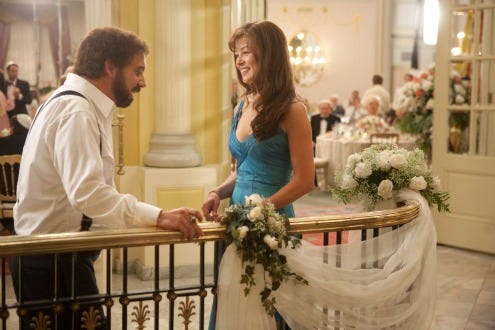Barney's Version

Two-hour films are not the right venue in which to tell a life story. Novels and miniseries have more time to devote to the characters and the long, full story. "Barney’s Version" tries to keep its focus on the life of Barney Panofsky to only three decades, but it still feels a bit compressed.
Paul Giamatti is Barney, a complex life with romantic ups and downs. In the 1970s, he met his first wife in Rome under unfortunate circumstances. He finds some stability with his second wife, Minnie Driver, when he moves to Canada. Unfortunately, it is during his wedding night that he meets the real love of his life, Miriam (Rosamund Pike).
The film is told in a series of flashbacks. Barney is thinking about his past as he’s working at his television-producing job that he hates. (Fans of Canadian directors and actors will have fun with these cameos.) This sort of non-linear format was rather unnecessary because instead of the unpredictable nature of Barney’s life, it now feels like it is just completing pieces of the puzzle.
Even though there aren’t enough of the little moments that feel like a completed life, "Barney’s Version" does a lot of things right. Despite having a difficult character to work with, Giamatti creates a lot of depth and sympathy. The strongest parts of the movie are when he is with his father, played by Dustin Hoffman. Those are scenes with two very talented actors who can establish the feeling of a long, emotional relationship.
With more time, we can see these characters behind the scenes that have to move the plot forward. Not every scene feels like obvious setup, but it does give the feeling that this is but a good adaptation from a great novel. The early days in Rome feel complete but the last third of the film feels a bit empty. Barney's middle age isn’t as exciting as his romantic days, but there could have been more with the evolution of his family life, especially with his children.
With the abridgment, the film does move with ease. The dialogue is sharp without ever appearing too witty. Director Richard J. Lewis balances the characters with their flaws and successes so that they all feel very layered. A few of the side characters are compromised with simplicity, but all of the major ones get due attention.
Ultimately, it all has to come down to Barney. Giamatti gives a very strong performance to help create a full and thought-provoking story. So at the end, we can make our own decisions on the path of his life. As long as that ambiguity remains, then the film is still worth seeing.


